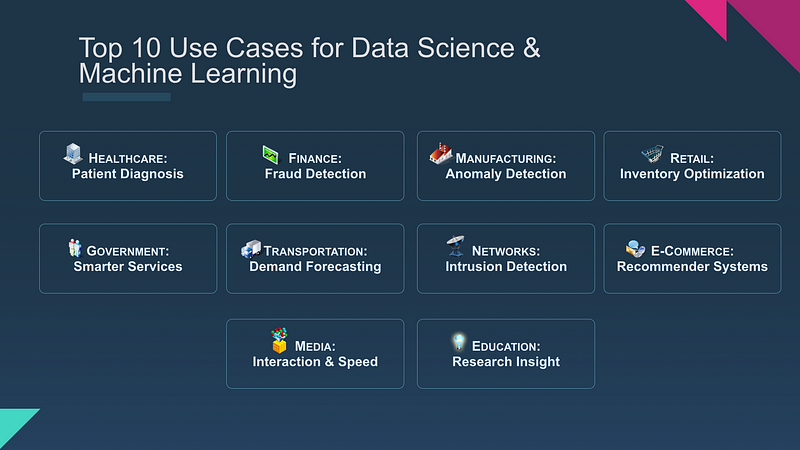Top 10 Machine Learning Use Cases: Part 2
This post is the second in a series whose aim is to shake up our intuitions about what machine learning is making possible in specific sectors — to look beyond the set of use cases that always come to mind.
By Steve Moore, IBM Story Strategist. Sponsored Post.
Last month, we published Part 1 of a series of posts designed to highlight the Top 10 use cases from the IBM Machine Learning Hub. In particular, we’re eager to share scenarios that can stretch our understanding about machine learning — compliments of our collaborations with data scientists from across our client base.
If you are interested to try out new IBM’s Watson Machine Learning service - click here
To try the Data Science Experience - subscribe for the free trial
The goal of the series is to look beyond the usual set of machine learning use cases that come to mind when considering a particular sector. For example, Part 1 focused on government but looked beyond the role of ML in sentencing and parole to explore use cases driving vital improvements to regional and municipal agencies. Here in Part 2, we’ll look beyond the role of ML in oncology and radiology to its influence on mental health, whole-life health, and reducing re-admission rates.
1. Helping Reduce Re-admission Rates with ML
Hospital and clinics assess their own effectiveness in many ways — from average patient stay to ER wait times to direct surveys of service. High on the list of metrics is the re-admission rate, defined as the return of a discharged patient to the hospital or clinic within some specified amount of time. Readmissions can create huge costs — and hassle — for providers, insurers, and patients alike.
But now a healthcare system in the US is using machine learning to help create a lens into the factors that impact readmission. Starting as an effort to anticipate readmission rates, the predictive modeling and cognitive evaluation models aggregated many factors: doctors’ notes, healthcare annotators, social factors, patient demographics, and more. Not only did the models help improve prediction accuracy by 47 percent, they helped isolate factors that work to reduce re-admission rates across the board, keep patients healthier, and save money.
2. ML and Health for a Lifetime
An international healthcare company based in Warsaw offers hospital and clinical care in its own health centers through a wide network of affiliates. For years, they’ve coordinated primary and specialty care, diagnostic testing, hospital services, and follow-up care.
Because they provide end-to-end care across the lifetimes of their patients, the data they capture is giving them incredible power to personalize health care plans that serve patients better, smooth the transitions between centers of care, build trust, and slash costs. Doing so means running deep analytics on the combination of patient data, risk factors, and proactive solutions.
3. Bringing ML to Programs for Mental Health
Research into mental health and addiction issues is a complicated endeavor by any standard — but even more so for researchers eager to bring the insights from their labs and clinics into real-world programs for helping struggling individuals to improve their lives. That’s the mandate of a research institution in the northeastern US that worked with IBM to organize, maintain, and mine their research for trends in the data that could inform the interventions they undertake. With help from IBM offerings, they built a system that tracks results across research environments, across patients, and across time.
Because finding adequate resources to pay for programs can be a challenge, the ability to substantiate the rigor of their findings — and the results of their interventions — helps convince funders to support the institution’s vital work.
Picture of Health
As data continues to flood into healthcare systems from procedures, check-ups, prescription info, wearable sensors, and more, providers are poised to use machine learning to root out inefficiency and dazzle patients with improved services and outcomes. Progress relies on all of us to see and advocate for the opportunities. Let’s continue to evangelize for machine learning — and to keep sharing the new visions for bringing it to bear.

Credit: Diganta Talukdar, Wikimedia Commons
If you are interested to try out new IBM’s Watson Machine Learning service - click here
To try the Data Science Experience - subscribe for the free trial

